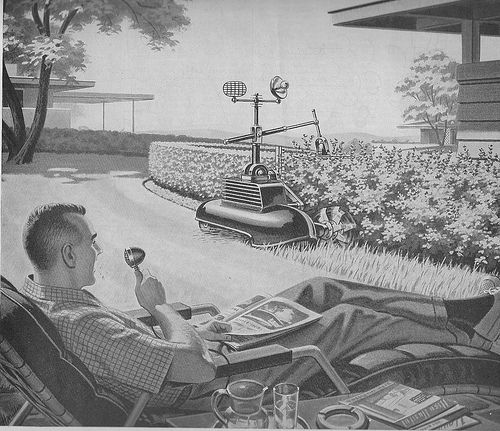Self-driving cars will be perfected…someday. When he’s not choosing the political system for Mars, Elon Musk predicts they’ll arrive by 2020 or so. Maybe, or perhaps it will take significantly longer, but I think the important point is that it’s pretty sure now that this future will eventually materialize.
My instinct is that having fleets of driverless cars won’t encourage grater sprawl, won’t lead to Suburbs 2.0. Cities are still desired, with working-class folks hanging on for dear life to living in NYC and SF, places which long ago priced out many of them. It’s odd to see this stubborn refusal to be pushed from the crowd in an age in which so many people just sit at home binge-watching near-TV shows regardless of how fancy their address may be.
In fact, autonomous vehicles that you don’t need to own (that no one really needs to own) will likely make urban living less tedious as well as less expensive. There will be no more parking spots to pursue, less rush-hour traffic (supposedly) and a much cleaner environment.
The Internet itself was supposed to empty out cities, allowing people to telecommute and have millions more products than a brick-and-mortar mall could hold delivered quickly to their doorsteps, regardless of where they laid their WELCOME mat. Cities have instead just become more densely populated in the last 20 years.
In his latest Wall Street Journal column, Christopher Mims makes a compelling argument to the contrary, believing driverless cars becoming a going concern would encourage us to fan out and set our self-driving mowers to work on our newly acquired lawns.
His opening:
Imagine a world in which hardly anyone owns a car. Instead, most people subscribe to a service for self-driving cars, probably a mashup of the current players in the space, which include Google, Uber, Lyft, Apple, Chrysler, Volkswagen, Tesla, BMW, Toyota, General Motors, Ford and others.
Call this hypothetical service Applewagen, or Tyft or, what the heck, Goober. The service is great. You whip out your circa-2025 smartwatch, which has all but replaced your phone, bark a command and a self-driving car appears, from a fleet circulating nearby. Maybe there are other people in the car, headed in your direction. Don’t worry, they are friendly. They have four-star ratings just as you do, and anyway they are too absorbed in their augmented-reality headsets to talk to you.
Here is the weirdest thing about this hypothetical future: where you live. Nearly everyone who has studied the subject believes these self-driving fleets will be significantly cheaper than owning a car, which sits idle roughly 95% of the time. With the savings, you will be able to escape your cramped apartment in the city for a bigger spread farther away, offering more peace and quiet, and better schools for the children.•
Tags: Christopher Mims

